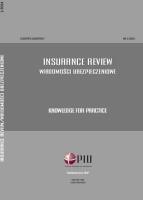Is an EU Member state a weaker party
in the context of the rules of jurisdiction
in direct actions against insurers? comments
on the request for a preliminary ruling in the case Mutua Madrileña automovilista, c-536/23
Is an EU Member state a weaker party
in the context of the rules of jurisdiction
in direct actions against insurers? comments
on the request for a preliminary ruling in the case Mutua Madrileña automovilista, c-536/23
Author(s): Krzysztof PacułaSubject(s): Law, Constitution, Jurisprudence
Published by: Polska Izba Ubezpieczeń
Keywords: private international law; injured party; direct action (actio directa)
Summary/Abstract: The request for a preliminary ruling in the case Mutua Madrileña Automovilista, C-536/23, puts to the ul- timate test the concept of “weaker party” that underpins the ...U rules of special jurisdiction in direct actions against insurers. The referring court asks whether an ...U Member State, acting as a statutory subrogee to the rights of its employee injured in a road traffic accident, can rely on the rule of special jurisdiction established by Articles 11(1)(b) and 13(2) of the Brussels I bis Regulation for the benefit of injured parties. Against this background, first, the preliminary question is based on a premise that the ...U Member State may sue the insurer “before the courts for the place where the official [...] is domiciled”. This premise seems misguided. In fact, a successor in title of a directly injured party may bring the direct action before the court of their own domicile. Second, it is immaterial that an ...U Member State is a subject of public international law. Unless the state acts iure imperii [arg. ex Art 1(1) of the Regulation], it can rely on the rules of jurisdiction provided for in the Regulation, including the rules of special jurisdiction in matters of insurance. Third, since the rules of special jurisdiction in direct actions against insurers are established for the benefit of weaker parties, they cannot be relied on by the “professionals in the insurance sec- tor”. To verify whether a claimant qualifies as such a professional in the insurance sector, a two-tier analysis is proposed. In the first step, an abstract and generalising assessment is carried out in or- der to verify whether the claimant belongs to the insurance sector or has close ties with that sector as the result of dealing (litigating or settling) regularly with the insurance claims as the inherent aspect of the commercial activity model they adopted or public mission they were entrusted with. In the sec- ond step, an additional check has to be made in order to ascertain whether the direct action brought against the insurer fits within such a general and abstract profile of the claimant or not. If the direct action does not originate in such a commercial activity or public mission, the claimant cannot be con- sidered as a “professional in the insurance sector” in the context of the specific proceedings. In the light of the above, the contention is that an EU Member State, which, in its capacity of an employer continued to pay the remuneration to its official who became unfit for work as a result of a road traffic accident and which subrogated to the official’s rights vis-à-vis the insurer that provides the civil liability insurance for the vehicle involved in that accident, may rely on the rule of special jurisdiction set forth in Articles 11(1)(b) and 13(2) of the Brussels I bis Regulation.
Journal: Wiadomości Ubezpieczeniowe
- Issue Year: 2024
- Issue No: 1
- Page Range: 3-20
- Page Count: 18
- Language: English

